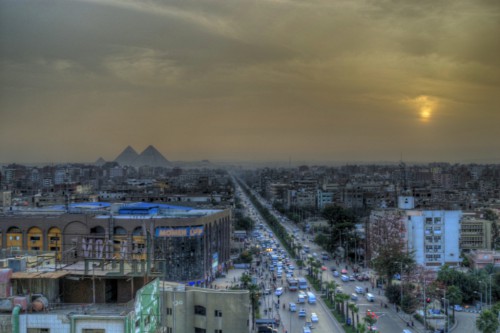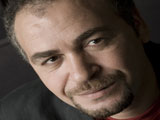Writing…
by Hamdy El-Gazzar and translated by Amani Elmawed / September 23, 2013 / No comments
Something happens while writing…

The sun sets over the Giza Pyramids. Photo: Antti Merivirta via Flickr
Today I will allow myself to talk about writing a novel. In particular, my novel Secret Pleasures. Maybe I’m doing this because I need to share it with you, but more likely it’s because what I want to say is related to everything that’s happening and has happened in Egypt since the Kefaya movement appeared in 2004.

- “From Egypt” attempts to draw a cultural map of Egypt and the Arab world by profiling the artistic, literary, and political issues that affect the region via on-the-ground coverage of current events, publications, and the fight for freedom of expression.

- Hamdy El-Gazzar is an Egyptian writer and one of the 39 young Arab writers included in the Beirut 39 Project. His first novel, Sihr Aswad (Dar Merit, 2005) won the prestigious Sawaris Award, and was subsequently translated by Humphrey Davies (Black Magic, AUC Press, 2007). His second novel, Ladhdhat Sirriyya (Secret Pleasures) was published by Dar al-Dar in 2008. He is currently working on a third novel.
“I knew I was dead.”
These words begin Secret Pleasures. But at the end of 2005 these five words tumbled over my head and ran through my mind like the wheels of a train, leaving me in a state of intensity for two and a half years. They would not leave me alone. I tried to get rid of them, separate myself from them, analyze them, and make an image out of them. I tried everything until I thought I understood all of the phrase’s deep and shallow meanings. Then I began to depict these perceived meanings in thousands of words, which lay on hundreds of pages, all in one volume. Later, in the fall of 2007, I traveled to the U.S. for three months. I took all of what I’d written with me, and added several chapters to it. However, when I returned to Giza at the end of the winter I deleted all of the new material.
In the spring of 2008 I cloistered myself in my bedroom for the final six months of writing. In a prison of my choosing I worked on this huge manuscript with the perseverance of a stubborn old man, carving a hunk of granite, trying to create a panacea from and for the only art on his mind. Six months of a hermit’s isolation, like a criminal sentenced to hard labor, whose penalty and torment was constructing one mountain and deconstructing another!
A contract of construction and deconstruction… Yes, writing is all about that.
Secret Pleasures is told from the perspective of a writer isolated in a room at the center of a noisy twenty-four-hour market. He is a lonely, dreary novelist trying to study the relationship between the humans of ancient Giza and the people in this modern world of power, oppression, and fear, who are terrified of tomorrow. This is what he was trying to create a novel about. In the midst of the noise and hijinks, abundance and contradiction, he, I, we, were struggling to create an artistic logic for the work while searching for answers to aesthetic questions about the concept of novelistic time.
Because I was living in Giza and felt close to my protagonist, my meditations on the city’s diverse and continuous motion took on new importance; I began to move fluidly between my inner self and the outer world. Bit by bit, this situation shed light on the dark areas between objective, external reality and the novel’s imaginative, artistic reality. In the process, some of the secrets and pleasures around me were illuminated; some of Giza’s hidden lives became visible from underneath the crowds and noise and the city’s covert and overt deals. These were the things I tried to capture sharply, with the determined patience of an old man boasting that he can impose the art of form over content to solve the question of time, and, along with it, replant the foundations of the novel itself. Consequently, the language came out dressed the way I wanted.
In essence, writing is like meditating, with its blend of the imaginary and the realistic. Its only medium is language, which needs a dead heart, an alert mind, a strong, steady hand, and a release of the unconscious. Writing also can’t live without the writer’s cruel clarity towards his words and work; he mercilessly removes what must be taken out.
The artistic themes that I tried to approach in Secret Pleasures were fear, panic, and horror at the criminals and murderers who had been able to do what they wanted. I also wanted to tackle our fear of the unknown and of murder and death, which are eventually shown in one of the main characters, and in the novelist.
Simply and shortly, the novel is about Rabih Al-Hajj, a TV news broadcaster who cannot endure his strict wife. He soon falls in love with Nashwa, a woman of rare beauty and character. But Rabih discovers that she’s the wife of an officer who’s presence is both absent and dominant. The novel has three parts over thirty-one chapters that investigate the history of horror and fear in Egypt, which has come from authority, in all its forms, pictures, and symbols. The book also depicts the personal history of most people in my generation, who belong to different groups of the declining middle class. This generation was born in the shadows of setback and defeat. As children, not only did we wear shirts imprinted with the face of “the hero of war and peace” wreathed by an olive branch, we also spent our youth in the eternal shadow of an authority that gained control after the death of Sadat.
I wanted Secret Pleasures to be a work made of idioms from fine art; graffiti with multi-characters and abundant details. I wanted it to be a visual world that addressed sight first and then insight, and after that a film with many characters, events, narratives, and a soundtrack. Made of the realistic and the imaginary, it’s a semi-epic movie that shows the whole of Giza: The arenas and fields, the roads, the buildings, the alleys, the people, the smells, the Nile, the pyramid tunnel, and Abbas’s Bridge. Eventually, it’s a world that needs meditation and careful consideration to uncover its essence and rebuild it. This is what I’ve wanted to do all the years of my life in Giza, and what I wanted to depict in my writing.




